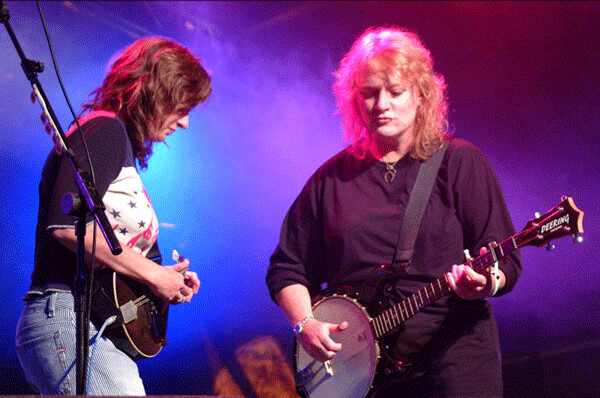Indigo Girls are fine but not closer to giving up

The Indigo Girls had an epiphany when they met Native American activist Winona LaDuke in the early 1990s. “I am now unable to see environmentalism or activism except through the eyes of the Indigenous,” said Emily Saliers, half of the Grammy-winning duo. “There is no ‘activism,’ this is our lives.”
Saliers and fellow I.G. Amy Ray founded the nonprofit Honor the Earth in 1993 and LaDuke is the executive director. Honor the Earth is sponsoring the Water is Life Festival this Sunday, July 22, starting 3 p.m. at Bayfront Festival Park. It’s a day of music and awareness-raising featuring, naturally, the Indigo Girls themselves. There are numerous other performers of note: Chastity Brown, Annie Humphrey, Sister Tree, Lyz Jaakola and Corey Medina.
The Indigo Girls are perhaps best known for their first hit from 1989, “Closer to Fine.” (Chorus: “I went to the doctor, I went to the mountains / I looked to the children, I drank from the fountains.”) But that’s just the tip of the iceberg for a three-decade career, which includes 23 albums, three of which went platinum, and that doesn’t include solo efforts and side projects.
Saliers and Ray still live in their home state of Georgia, but Honor the Earth is headquartered in Minnesota. The festival is a fundraiser for the organization, which is currently focused on opposition to the proposed Line 3 oil pipeline that is planned to run through Minnesota to Superior.
The concert is inadvertently well-timed as the Minnesota Public Utilities Commission, on June 28, gave Line 3 the green light, going against recommendations from the state administrative law judge and the Department of Commerce. That development “was totally unexpected,” Saliers said. “All signs pointed to a No decision.”
What’s left to do to oppose the line? “Hopefully there are some legal options,” said Saliers. But she also foresees protests similar to Standing Rock, North Dakota in 2016, in which Honor the Earth took part.
Despite their seriousness about causes, the Indigo Girls’ lyrics are more poetic than preachy and messages don’t get in the way of infectious tunes. They’re often celebrated as LGBT icons, and though both are gay -- if not for each other, as they are married to separate partners -- they don’t care to be known as “lesbian folk singers.” Ray told the Huffington Post in 2016, “We’re proud of who we are and what our identity is, and we’re going to make the best music we can and we don’t want to be held back by a label that implies mediocrity or something.” Indeed a scan of their discography shows their music is often more rock than folk but crossing many genres, and is consistently amazing.
They attended the same elementary school near Decatur, Georgia, started performing together in high school, and both ended up at Emory University in Atlanta. They chose “indigo” while searching through the dictionary for a name. The duo act is just one of their careers; they each have produced solo albums and Ray is about to release her seventh. Their independence from each other might be part of the reason for their longevity. “We have plenty of separation,” Saliers said. “That’s why it’s so great when we get back together.”
Over the years they’ve advocated for numerous causes, but the current president is now rolling back the progress won over the years. Saliers has lived through Nixon to George W. Bush, but “Trump is a new thing to me. I’ve never seen anyone do the things he’s done,” she said.
“I do feel despair in moments,” she said. “But signs point to hope.” For one, Stacey Abrams, Democratic candidate for governor in Georgia, is the first black woman to achieve a major party nomination for governor. “The pendulum sways. What has been robbed can be brought back,” she said.
Trying to change the minds of Trump supporters on a national level shouldn’t be the goal, she said. “I don’t think you can just win them over. They see government as a wasteful machine. Grassroots and local empowerment is much more important. I think we can see some common ground. There has to be change on a communal level rather than north vs. south.”
Meanwhile they continue to evolve. “Musically I think we’re growing, but we still deal with the same themes,” she said. “We try to grow as songwriters. All things have been the same source while the world changes around us. Music is a great sustainer, a life-giving source. We share it with a few chords.”
Tickets for the Water is Life Festival are $25, available online at honorearth.org/lwno2018.
